Iranians Withdrawing Capital From Stock Exchange Market
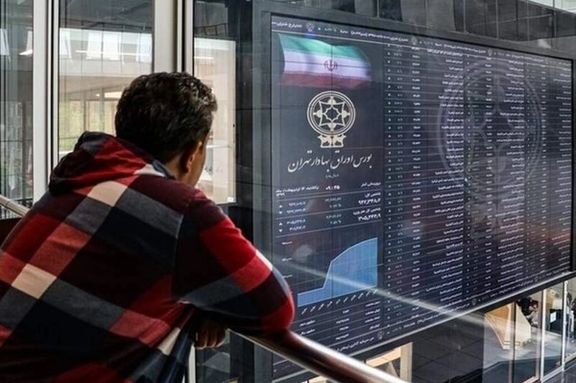
Amid nationwide antigovernment protests, over 36 trillion rials (over $120 million) has been withdrawn from Tehran’s Stock Exchange market only in the past 10 days.

Amid nationwide antigovernment protests, over 36 trillion rials (over $120 million) has been withdrawn from Tehran’s Stock Exchange market only in the past 10 days.
The amount of capital withdrawal from the stock market and the fall of the total index has been accelerating in the past few weeks as protests and strikes have been intensifying especially after mid-September, when a 22-year-old woman was killed in police custody.
The withdrawn money may seem meager compared with international stock exchanges, but TSE is the most important and biggest Iranian stock exchange market, and considering the currency rate, it amounts to a huge sum in rials.
TEDPIX, the main index of Tehran Stock Exchange (TSE), lost 69,000 points in the previous Iranian calendar week, which ended on Friday, October 28.
Since mid-May, the index has been in constant decline due to political uncertainties, with a few small insignificant peaks when the hopes for reviving Iran’s 2015 nuclear deal were high momentarily.
The future of Iran’s exchange market will depend on political stability, structural reforms and restoring the Joint Comprehensive Plan of Action (JCPOA), all of which seem improbable as the current wave of protects shows no sign of abating and more and more countries are intensifying their punitive measures against the regime and its officials.
On October 18, United States’ officials reiterated their support for the ongoing protests in Iran with Special Envoy Robert Malley saying that the talks to revive the nuclear deal are no longer on the agenda.
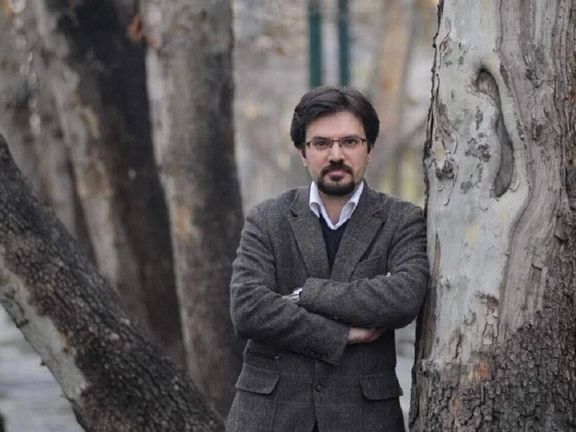
A well-known whistleblower and investigative journalist in Iran says people in the Islamic Republic political system are not accountable for their performance.
Yashar Soltani, who has spent some time in jail in 2016 for disclosing financial corruption at Tehran Municipality under current parliament speaker Mohammad Bagher Ghalibaf, added in an interview with Etemad Online that the way government treats financial corruption is woefully disappointing.
The multi-billion dollar case involving the former mayor, a figure close to Supreme Leader Ali Khamenei, ended in the arrest of Isa Sharifi, one of Ghalibaf's deputies and was finally pushed under the carpet although Khamenei in 2018 called for investigation into the case. Sharifi's name came up once again in February 2022 along with Ghalibaf's in a major corruption case at the IRGC, which also remained inconclusive after a few weeks of controversy stirred by rival political factions in Iran.
The controversy about the IRGC corruption case was silenced soon possibly because even former IRGC Qods Force Commander Qasem Soleimani was also involved, as revealed in an audio tape that was leaked in the public domain presumably by those who benefitted from the revelations.
As a whistleblower who has been exposing financial corruption in Iran since the 1990s, Soltani says that corrupt individuals have never left the system even after their performance was exposed, and corruption is constantly on the rise. He added that the Iranian justice system discriminates in favor of corrupt individuals when they are close to the core of the regime, namely Khamenei's household.
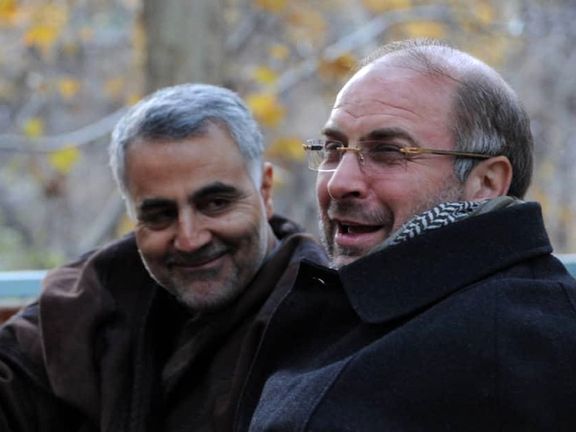
He said: "Fighting corruption is part of the people's demands as the magnitude of government corruption is so high that the regime has no way but to try to control it through introducing reforms in the system." However, he acknowledged that most of the rhetoric about fighting government corruption is just a show, often with the intention of winning the people's attention at election times or to calm the situation when there are major protests.
Soltani pointed out that while corruption trials were held openly and the people could watch hearings on live TV in the 1990s, corruption cases are now shrouded in an aura of secrecy. Soltani reiterated that as long as talk about corruption is aimed at beatifying the political system or garnering support for a group of candidates, there will be no hope in controlling it.
Nonetheless, there seems to be some progress in the process. "When I disclosed the astronomical real estate case [in Tehran municipality] in 2016, I was jailed immediately, but five years later I was called for consultation for writing a new law to prevent that kind of corruption as part of which the Municipality gave land and buildings to influential individuals to garner their support," Soltani recalled.He added that regardless of his help, the Iranian Judiciary has been summoning him during the past 11 years to subtly warn him about his whistleblowing activity.
"They ask why me and not the intelligence agencies investigate a case. Well, the intelligence agencies did their own research but what they got nowhere because there are flaws in the structure of the government," he said, adding that, "There are only four or five people who continue as whistleblowers, and all of them like me work single-handedly without any support from anyone in the system."
Referring to the problems in the system, he said the corruption case at the Petrochemical Complex (PCC) was a major case. But there were a few stage-managed court sessions and nothing more happened.
He was referring to a case of hundreds of million of dollars embezzled by officials who were tasked to sell Iran’s petrochemical products through obscure channels and return the money to the treasury during international sanction in 2010-2013.
Soltani concluded: "There are so many inconclusive cases about financial corruption in Iran. In a corrupt structure you cannot claim to be dealing with corruption."
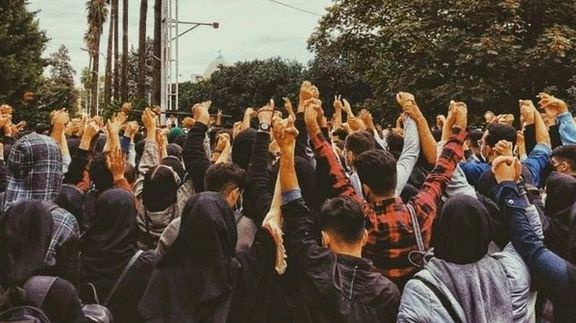
Iran's security forces focusing on student protesters lately are using plainclothes agents to arrest and abduct students in universities across the country.
By Iranian law, military and law enforcement forces are banned from entering university grounds or making arrests inside campuses, but in the past few days plainclothes agents have attacked student gatherings and dormitories in several universities arresting several hundred people often using great violence.
University security guards responsible for protection of students often looked the other way or cooperated with the plainclothes agents, students say. Protests, however, have grown even bigger after the attacks and arrests.
“Please help! They are murdering us here! We need the world to hear our voice,” a student from Sadaf dorm of Jondishapour University in Ahvaz told me in a chat in the early hours of Saturday morning.
Minutes earlier security forces had raided Sadaf dorm. A video students shared on Twitter showed several plainclothesmen dragging a student, Mohammad Safaei, on the floor while he cried for help from fellow students.
Students besieged by IRGC Basij forces inside a section of Mashhad University
“They cut off the power in the dormitory and forced their way into the building … The [plainclothes] IRGC and Basij people and intelligence ministry agents have stationed themselves in front of the entrance and are preventing students from coming and going,” the student said, adding that the assailants threatened to shoot other students to stop them from helping Safaei. “They abducted four of us.”
Mobile internet was completely shut off and wi-fi was intermittent, my student contact said on the night of the raid. “It takes me so much effort to connect to the wi-fi, it’s exhausting to post anything.”
On the same night they arrested three other students for writing antigovernment slogans on the walls of their campus and protesting peacefully. “If a hair is lost [on the head of a student], a thousand will rise,” students who gathered on the campus grounds afterward the arrests chanted.
Similar raids have been made on several other campuses including Noshirvani University of Technology in the northern city of Babol in Mazandaran Province where at least 25 students were arrested Wednesday. Plainclothesmen fired bullets and tear gas inside the dormitory compound during the incident.
“They are shooting at us inside the university, it's not birdshot it's real live ammunition,” one of the students trapped at Sanandaj University tweeted Sunday morning while a Twitter post by a relative of a student abducted in Kermanshah, Mahshid Moshashaei, begged everyone for information on her whereabouts. Moshashaei was taken, apparently by intelligence ministry agents, from her dormitory on Saturday.
In Mashhad, Iran’s second most populous city, plainclothesmen barricaded the gate of Azad University for hours Saturday night and trapped the students inside. Parents and worried citizens who had gathered in front of the university were attacked by plainclothesmen, too. Students say around 10 of them were arrested during the standoff.
In a statement released on social media Sunday, said they would go on indefinite strike in protest to the violence by university security and plainclothesmen.
Students have posted a video showing a young woman, probably a student, being forced into a car by plainclothes agents early Saturday morning in front of the same university. Witnesses said on Twitter that those who tried to prevent the abduction were tasered by one of the plainclothes agents.
Plainclothesmen’s violence against students has risen to such levels that students belonging to the regime’s Basij militia have found it indefensible and even repugnant.
In a video posted on Twitter, the Basiji student recording a standoff between protesting students and the agents at Esfahan University Saturday says, “They are not Basijis, [pro-government] revolutionary students are on this side. These guys who are wielding chains [to hit students] are hooligans who are from outside [the university].”
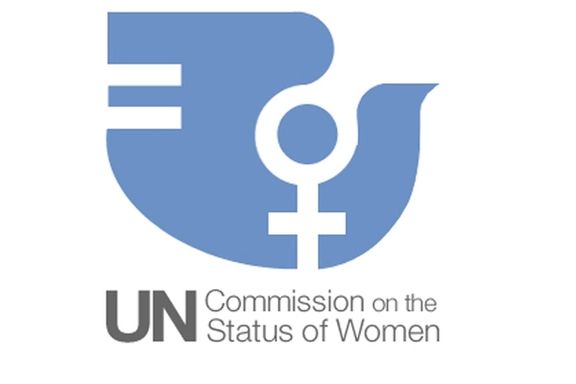
A group of women leaders in business, politics, and the arts from over 14 countries has called for the immediate expulsion of the Islamic Republic from the UN Commission on the Status of Women (CSW).
In an open letter, published in The New York Times on Sunday, the preeminent leaders expressed their solidarity with Iranian women and girls, as well as men, who are holding daily protests for more than 40 days across the country and abroad following the death in custody of 22-year-old Mahsa Jina Amini.
Signatories of the letter include former US Secretary of State Hillary Clinton and First Lady Michelle Obama, Canada's Deputy Prime Minister Chrystia Freeland and media tycoon Oprah Winfrey as well as Nobel laureates Malala Yousafzai and Nadia Murad.
They also launched a petition on www.womanlifefreedom.today that calls on the United Nations to expel the Islamic Republic from the commission, receiving more than 21,000 signatures within the first few days of going live. Additionally, more than 130,000 petitioners have also signed another letter asking for the same outcome on Change.org.
Lamenting the Islamic Republic's record on women's rights and the brutal violence of security forces against peaceful protesters, they said, “Earlier this year, to the dismay of women's rights advocates around the world, Iran began a four–year term on the UN's 45–member Commission on the Status of Women. This preeminent global body is exclusively dedicated to promoting gender equality and women's empowerment. The Islamic Republic of Iran's long–standing, systematic oppression of women should have disqualified them from election to the CSW."
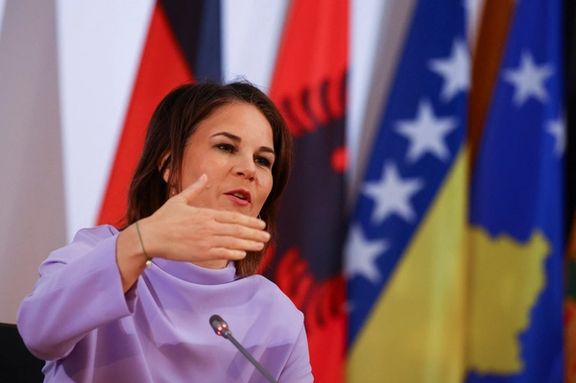
Germany and the European Union are examining whether to classify Iran's Revolutionary Guard as a terrorist organization, Foreign Minister Annalena Baerbock said Sunday.
"I made it clear last week that we will launch another package of sanctions, that we will examine how we can also list the Revolutionary Guards [IRGC] as a terrorist organization," Baerbock said in an interview with ARD broadcaster on Sunday.
Iran’s security forces headed by the IRGC have killed more than 270 people during the six-week long protests.
The IRGC is already listed as a terrorist organization by the United States.
Her comments come after the head of the Revolutionary Guard, Hossein Salami, warned protesters that Saturday would be their last day of taking to the streets, in a sign that security forces may intensify their already fierce crackdown on widespread unrest.
However, students in several Iranian universities protested on Sunday, with security forces breaching the campus enclosures violating the law and trying to disperse and arrest student.
Anonymous protest leaders have called for nationwide demonstrations on Monday, October 31.
Germany last week said it was tightening entry restrictions on Iran beyond an already announced EU sanctions package.
Baebock also said there were currently no negotiations about the nuclear agreement between Iran and the West.
Reporting by Reuters
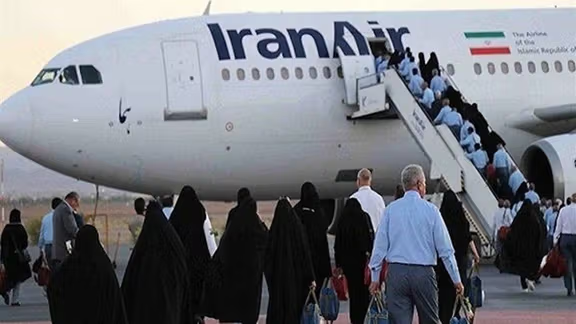
Unconfirmed reports suggest that Iranian officials are sending their family members and assets abroad amid antigovernment protests that show no sign of abating.
According to a report on the website of UK’s Daily Express, top officials of the Islamic Republic are reportedly attempting to secure British passports for their families to exit the country since Iranians have revolted against the regime following the death of Mahsa Amini, a 22-year-old woman who was killed in police custody in September.
Citing an unnamed Iranian source, the report also claimed that officials have been chartering up to "five flights a day" for their families, adding that some sections of “Tehran’s main airport” have been taken over as a fast-track area for their own family and friends to escape the country.
The source said things are moving fast at the airport, noting that “It started more than two weeks ago. The regime changed all security details at the airport. They were moving civilians (friends and family) from the back entrance of the airport directly to the airplanes for international flights.”
According to the source, the airport authorities have taken several measures to prevent the news of the departures from reaching the media and people, saying, “They would move the regular staff away whenever this was happening and confiscate their phones. They also replaced the regular staff who are handling the…VIP section of the airport with their own staff.”
However, so far there have been no confirmed reports about regime insiders and their families leaving the country.
The source added that top officials of the regime are also seeking to acquire Canadian, British and Swiss passports.
British conservative lawmaker Bob Stewart said he has heard that Iranian officials are fleeing to the United Kingdom and asked Foreign Office Minister Gillian Keegan if those reports would be investigated. In Response, Keegan has said, "Obviously, we have our own rule of law here in the UK, but in relation to the rumors…about passports, I haven’t heard those, but I will certainly look into that and write to him.”
Canadian Prime Minister Justin Trudeau announced on October 29 that his country will tighten visas for people affiliated with the Iranian regime. Germany has also made a similar announcement.
The exodus of Islamic Republic politicians and officials comes on the backdrop of daily protests that seem to be gaining momentum during the last six weeks, with more and more states expressing support for the uprising and sanctioning regime officials.
There are also unconfirmed reports that officials are transferring their assets to friendly countries and there are official reports that many high-priced and luxurious real estates in the capital Tehran are being sold below market value, strengthening speculations that some of the rich are in a hurry to leave the country.

Social media users are reporting regular money transfers abroad by high-ranking officials of the regime. According to one account, former Foreign Minister Javad Zarif’s wife is said to have transferred €4 million to an ABC Bank account in Shanghai through some agencies in Dubai.
A recent report by the government’s official news agency, IRNA, confirmed the sale of many apartments cheaper than their estimated prices, describing it as the result of lower purchasing power due to economic crisis. However, the purchasing power of Iranians has been low for at least a couple of years due to 40-percent inflation, but the housing prices never dwindled.
Moreover, a lot of top officials, including lawmakers and military commanders, have been active in the construction business in recent years, making the best use of their connections to circumvent regulations and the ability to take big bank loans, something impossible for ordinary Iranians.